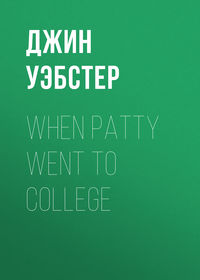 полная версия
полная версияDear Enemy
is an exact description of their arrival.
We need a field worker to travel about the country and pick up all the hereditary statistics she can about our chicks. It will be an easy matter, as most of them have relatives. What do you think of Janet Ware for the job? You remember what a shark she was in economics; she simply battened on tables and charts and surveys.
I have also to inform you that the John Grier Home is undergoing a very searching physical examination, and it is the shocking truth that out of the twenty-eight poor little rats so far examined only five are up to specification. And the five have not been here long.
Do you remember the ugly green reception room on the first floor? I have removed as much of its greenness as possible, and fitted it up as the doctor's laboratory. It contains scales and drugs and, most professional touch of all, a dentist's chair and one of those sweet grinding machines. (Bought them second-hand from Doctor Brice in the village, who is putting in, for the gratification of his own patients, white enamel and nickel-plate.) That drilling machine is looked upon as an infernal engine, and I as an infernal monster for instituting it. But every little victim who is discharged FILLED may come to my room every day for a week and receive two pieces of chocolate. Though our children are not conspicuously brave, they are, we discover, fighters. Young Thomas Kehoe nearly bit the doctor's thumb in two after kicking over a tableful of instruments. It requires physical strength as well as skill to be dental adviser to the J. G. H. . . . . . . . . . .
Interrupted here to show a benevolent lady over the institution. She asked fifty irrelevant questions, took up an hour of my time, then finally wiped away a tear and left a dollar for my "poor little charges."
So far, my poor little charges are not enthusiastic about these new reforms. They don't care much for the sudden draft of fresh air that has blown in upon them, or the deluge of water. I am shoving in two baths a week, and as soon as we collect tubs enough and a few extra faucets, they are going to get SEVEN.
But at least I have started one most popular reform. Our daily bill of fare has been increased, a change deplored by the cook as causing trouble, and deplored by the rest of the staff as causing an immoral increase in expense. ECONOMY spelt in capitals has been the guiding principle of this institution for so many years that it has become a religion. I assure my timid co-workers twenty times a day that, owing to the generosity of our president, the endowment has been exactly doubled, and that I have vast sums besides from Mrs. Pendleton for necessary purposes like ice cream. But they simply CAN'T get over the feeling that it is a wicked extravagance to feed these children.
The doctor and I have been studying with care the menus of the past, and we are filled with amazement at the mind that could have devised them. Here is one of her frequently recurring dinners:
BOILED POTATOES BOILED RICE BLANC MANGE
It's a wonder to me that the children are anything more than one hundred and eleven little lumps of starch.
Looking about this institution, one is moved to misquote Robert Browning.
"There may be heaven; there must be hell; Meantime, there is the John Grier—well!"S. McB.THE JOHN GRIER HOME,
Saturday.
Dear Judy:
Dr. Robin MacRae and I fought another battle yesterday over a very trivial matter (in which I was right), and since then I have adopted for our doctor a special pet name. "Good morning, Enemy!" was my greeting today, at which he was quite solemnly annoyed. He says he does not wish to be regarded as an enemy. He is not in the least antagonistic—so long as I mold my policy upon his wishes!
We have two new children, Isador Gutschneider and Max Yog, given to us by the Baptist Ladies' Aid Society. Where on earth do you suppose those children picked up such a religion? I didn't want to take them, but the poor ladies were very persuasive, and they pay the princely sum of four dollars and fifty cents per week per child. This makes 113, which makes us very crowded. I have half a dozen babies to give away. Find me some kind families who want to adopt.
You know it's very embarrassing not to be able to remember offhand how large your family is, but mine seems to vary from day to day, like the stock market. I should like to keep it at about par. When a woman has more than a hundred children, she can't give them the individual attention they ought to have.
Monday.
This letter has been lying two days on my desk, and I haven't found the time to stick on a stamp. But now I seem to have a free evening ahead, so I will add a page or two more before starting it on a pleasant journey to Florida.
I am just beginning to pick out individual faces among the children. It seemed at first as though I could never learn them, they looked so hopelessly cut out of one pattern, with those unspeakably ugly uniforms. Now please don't write back that you want the children put into new clothes immediately. I know you do; you've already told me five times. In about a month I shall be ready to consider the question, but just now their insides are more important than their outsides.
There is no doubt about it—orphans in the mass do not appeal to me. I am beginning to be afraid that this famous mother instinct which we hear so much about was left out of my character. Children as children are dirty, spitty little things, and their noses all need wiping. Here and there I pick out a naughty, mischievous little one that awakens a flicker of interest; but for the most part they are just a composite blur of white face and blue check.
With one exception, though. Sadie Kate Kilcoyne emerged from the mass the first day, and bids fair to stay out for all time. She is my special little errand girl, and she furnishes me with all my daily amusement. No piece of mischief has been launched in this institution for the last eight years that did not originate in her abnormal brain. This young person has, to me, a most unusual history, though I understand it's common enough in foundling circles. She was discovered eleven years ago on the bottom step of a Thirty-ninth Street house, asleep in a pasteboard box labeled, "Altman & Co."
"Sadie Kate Kilcoyne, aged five weeks. Be kind to her," was neatly printed on the cover.
The policeman who picked her up took her to Bellevue where the foundlings are pronounced, in the order of their arrival, "Catholic, Protestant, Catholic, Protestant," with perfect impartiality. Our Sadie Kate, despite her name and blue Irish eyes, was made a Protestant. And here she is growing Irisher and Irisher every day, but, true to her christening, protesting loudly against every detail of life.
Her two little black braids point in opposite directions; her little monkey face is all screwed up with mischief; she is as active as a terrier, and you have to keep her busy every moment. Her record of badnesses occupies pages in the Doomsday Book. The last item reads:
"For stumping Maggie Geer to get a doorknob into her mouth—punishment, the afternoon spent in bed, and crackers for supper."
It seems that Maggie Geer, fitted with a mouth of unusual stretching capacity, got the doorknob in, but couldn't get it out. The doctor was called, and cannily solved the problem with a buttered shoe-horn. "Muckle-mouthed Meg," he has dubbed the patient ever since.
You can understand that my thoughts are anxiously occupied in filling every crevice of Sadie Kate's existence.
There are a million subjects that I ought to consult with the president about. I think it was very unkind of you and him to saddle me with your orphan asylum and run off South to play. It would serve you right if I did everything wrong. While you are traveling about in private cars, and strolling in the moonlight on palm beaches, please think of me in the drizzle of a New York March, taking care of 113 babies that by rights are yours—and be grateful.
I remain (for a limited time),
S. McBRIDE.
SUP'T JOHN GRIER HOME.
Dear Enemy:
I am sending herewith (under separate cover) Sammy Speir, who got mislaid when you paid your morning visit. Miss Snaith brought him to light after you had gone. Please scrutinize his thumb. I never saw a felon, but I have diagnosed it as such. Yours truly, S. McBRIDE.
SUP'T JOHN GRIER HOME,
March 6.
Dear Judy:
I don't know yet whether the children are going to love me or not, but they DO love my dog. No creature so popular as Singapore ever entered these gates. Every afternoon three boys who have been perfect in deportment are allowed to brush and comb him, while three other good boys may serve him with food and drink. But every Saturday morning the climax of the week is reached, when three superlatively good boys give him a nice lathery bath with hot water and flea soap. The privilege of serving as Singapore's valet is going to be the only incentive I shall need for maintaining discipline.
But isn't it pathetically unnatural for these youngsters to be living in the country and never owning a pet? Especially when they, of all children, do so need something to love. I am going to manage pets for them somehow, if I have to spend our new endowment for a menagerie. Couldn't you bring back some baby alligators and a pelican? Anything alive will be gratefully received.
This should by rights be my first "Trustees' Day." I am deeply grateful to Jervis for arranging a simple business meeting in New York, as we are not yet on dress parade up here; but we are hoping by the first Wednesday in April to have something visible to show. If all of the doctor's ideas, and a few of my own, get themselves materialized, our trustees will open their eyes a bit when we show them about.
I have just made out a chart for next week's meals, and posted it in the kitchen in the sight of an aggrieved cook. Variety is a word hitherto not found in the lexicon of the J.G.H. You would never dream all of the delightful surprises we are going to have: brown bread, corn pone, graham muffins, samp, rice pudding with LOTS of raisins, thick vegetable soup, macaroni Italian fashion, polenta cakes with molasses, apple dumplings, gingerbread—oh, an endless list! After our biggest girls have assisted in the manufacture of such appetizing dainties, they will almost be capable of keeping future husbands in love with them.
Oh, dear me! Here I am babbling these silly nothings when I have some real news up my sleeve. We have a new worker, a gem of a worker.
Do you remember Betsy Kindred, 1910? She led the glee club and was president of dramatics. I remember her perfectly; she always had lovely clothes. Well, if you please, she lives only twelve miles from here. I ran across her by chance yesterday morning as she was motoring through the village; or, rather, she just escaped running across me.
I never spoke to her in my life, but we greeted each other like the oldest friends. It pays to have conspicuous hair; she recognized me instantly. I hopped upon the running board of her car and said:
"Betsy Kindred, 1910, you've got to come back to my orphan asylum and help me catalogue my orphans."
And it astonished her so that she came. She's to be here four or five days a week as temporary secretary, and somehow I must manage to keep her permanently. She's the most useful person I ever saw. I am hoping that orphans will become such a habit with her that she won't be able to give them up. I think she might stay if we pay her a big enough salary. She likes to be independent of her family, as do all of us in these degenerate times.
In my growing zeal for cataloguing people, I should like to get our doctor tabulated. If Jervis knows any gossip about him, write it to me, please; the worse, the better. He called yesterday to lance a felon on Sammy Speir's thumb, then ascended to my electric-blue parlor to give instructions as to the dressing of thumbs. The duties of a superintendent are manifold.
It was just teatime, so I casually asked him to stay, and he did! Not for the pleasure of my society,—no, indeed,—but because Jane appeared at the moment with a plate of toasted muffins. He hadn't had any luncheon, it seems, and dinner was a long way ahead. Between muffins (he ate the whole plateful) he saw fit to interrogate me as to my preparedness for this position. Had I studied biology in college? How far had I gone in chemistry? What did I know of sociology? Had I visited that model institution at Hastings?
To all of which I responded affably and openly. Then I permitted myself a question or two: just what sort of youthful training had been required to produce such a model of logic, accuracy, dignity, and common sense as I saw sitting before me? Through persistent prodding I elicited a few forlorn facts, but all quite respectable. You'd think, from his reticence, there'd been a hanging in the family. The MacRae PERE was born in Scotland, and came to the States to occupy a chair at Johns Hopkins; son Robin was shipped back to Auld Reekie for his education. His grandmother was a M'Lachlan of Strathlachan (I am sure she sounds respectable), and his vacations were spent in the Hielands a-chasing the deer.
So much could I gather; so much, and no more. Tell me, I beg, some gossip about my enemy—something scandalous by preference.
Why, if he is such an awfully efficient person does he bury himself in this remote locality? You would think an up-and-coming scientific man would want a hospital at one elbow and a morgue at the other. Are you sure that he didn't commit a crime and isn't hiding from the law?
I seem to have covered a lot of paper without telling you much. VIVE LA BAGATELLE! Yours as usual,
SALLIE.
P.S. I am relieved on one point. Dr. MacRae does not pick out his own clothes. He leaves all such unessential trifles to his housekeeper, Mrs. Maggie McGurk.
Again, and irrevocably, good-by!
THE JOHN GRIER HOME,
Wednesday.
Dear Gordon:
Your roses and your letter cheered me for an entire morning, and it's the first time I've approached cheerfulness since the fourteenth of February, when I waved good-by to Worcester.
Words can't tell you how monotonously oppressive the daily round of institution life gets to be. The only glimmer in the whole dull affair is the fact that Betsy Kindred spends four days a week with us. Betsy and I were in college together, and we do occasionally find something funny to laugh about.
Yesterday we were having tea in my HIDEOUS parlor when we suddenly determined to revolt against so much unnecessary ugliness. We called in six sturdy and destructive orphans, a step-ladder, and a bucket of hot water, and in two hours had every vestige of that tapestry paper off those walls. You can't imagine what fun it is ripping paper off walls.
Two paperhangers are at work this moment hanging the best that our village affords, while a German upholsterer is on his knees measuring my chairs for chintz slip covers that will hide every inch of their plush upholstery.
Please don't get nervous. This doesn't mean that I'm preparing to spend my life in the asylum. It means only that I'm preparing a cheerful welcome for my successor. I haven't dared tell Judy how dismal I find it, because I don't want to cloud Florida; but when she returns to New York she will find my official resignation waiting to meet her in the front hall.
I would write you a long letter in grateful payment for seven pages, but two of my little dears are holding a fight under the window. I dash to separate them.
Yours as ever,
S. McB.
THE JOHN GRIER HOME,
March 8.
My dear Judy:
I myself have bestowed a little present upon the John Grier Home—the refurnishing of the superintendent's private parlor. I saw the first night here that neither I nor any future occupant could be happy with Mrs. Lippett's electric plush. You see, I am planning to make my successor contented and willing to stay.
Betsy Kindred assisted in the rehabilitation of the Lippett's chamber of horrors, and between us we have created a symphony in dull blue and gold. Really and truly, it's one of the loveliest rooms you've ever seen. The sight of it will be an artistic education to any orphan. New paper on the wall, new rugs on the floor (my own prized Persians expressed from Worcester by an expostulating family). New casement curtains at my three windows, revealing a wide and charming view, hitherto hidden by Nottingham lace. A new big table, some lamps and books and a picture or so, and a real open fire. She had closed the fireplace because it let in air.
I never realized what a difference artistic surroundings make in the peace of one's soul. I sat last night and watched my fire throw nice highlights on my new old fender, and purred with contentment. And I assure you it's the first purr that has come from this cat since she entered the gates of the John Grier Home.
But the refurnishing of the superintendent's parlor is the slightest of our needs. The children's private apartments demand so much basic attention that I can't decide where to begin. That dark north playroom is a shocking scandal, but no more shocking than our hideous dining room or our unventilated dormitories or our tubless lavatories.
If the institution is very saving, do you think it can ever afford to burn down this smelly old original building, and put up instead some nice, ventilated modern cottages? I cannot contemplate that wonderful institution at Hastings without being filled with envy. It would be some fun to run an asylum if you had a plant like that to work with. But, anyway, when you get back to New York and are ready to consult the architect about remodeling, please apply to me for suggestions. Among other little details I want two hundred feet of sleeping porch running along the outside of our dormitories.
You see, it's this way: our physical examination reveals the fact that about half of our children are aenemic—{aneamic}{anaemic} (Mercy! what a word!), and a lot of them have tubercular ancestors, and more have alcoholic. Their first need is oxygen rather than education. And if the sickly ones need it, why wouldn't it be good for the well ones? I should like to have every child, winter and summer, sleeping in the open air; but I know that if I let fall such a bomb on the board of trustees, the whole body would explode.
Speaking of trustees, I have met up with the Hon. Cyrus Wykoff, and I really believe that I dislike him more than Dr. Robin MacRae or the kindergarten teacher or the cook. I seem to have a genius for discovering enemies!
Mr. Wykoff called on Wednesday last to look over the new superintendent.
Having lowered himself into my most comfortable armchair, he proceeded to spend the day. He asked my father's business, and whether or not he was well-to-do. I told him that my father manufactured overalls, and that, even in these hard times, the demand for overalls was pretty steady.
He seemed relieved. He approves of the utilitarian aspect of overalls. He had been afraid that I had come from the family of a minister or professor or writer, a lot of high thinking and no common sense. Cyrus believes in common sense.
And what had been my training for this position?
That, as you know, is a slightly embarrassing question. But I produced my college education and a few lectures at the School of Philanthropy, also a short residence in the college settlement (I didn't tell him that all I had done there was to paint the back hall and stairs). Then I submitted some social work among my father's employees and a few friendly visits to the Home for Female Inebriates.
To all of which he grunted.
I added that I had lately made a study of the care of dependent children, and casually mentioned my seventeen institutions.
He grunted again, and said he didn't take much stock in this new-fangled scientific charity.
At this point Jane entered with a box of roses from the florist's. That blessed Gordon Hallock sends me roses twice a week to brighten the rigors of institution life.
Our trustee began an indignant investigation. He wished to know where I got those flowers, and was visibly relieved when he learned that I had not spent the institution's money for them. He next wished to know who Jane might be. I had foreseen that question and decided to brazen it out.
"My maid," said I.
"Your what?" he bellowed, quite red in the face.
"My maid."
"What is she doing here?"
I amiably went into details. "She mends my clothes, blacks my boots, keeps my bureau drawers in order, washes my hair."
I really thought the man would choke, so I charitably added that I paid her wages out of my own private income, and paid five dollars and fifty cents a week to the institution for her board; and that, though she was big, she didn't eat much.
He allowed that I might make use of one of the orphans for all legitimate service.
I explained—still polite, but growing bored—that Jane had been in my service for many years, and was indispensable.
He finally took himself off, after telling me that he, for one, had never found any fault with Mrs. Lippett. She was a common-sense Christian woman, without many fancy ideas, but with plenty of good solid work in her. He hoped that I would be wise enough to model my policy upon hers!
And what, my dear Judy, do you think of that?
The doctor dropped in a few minutes later, and I repeated the Hon. Cyrus's conversation in detail. For the first time in the history of our intercourse the doctor and I agreed.
"Mrs. Lippett indeed!" he growled. "The blethering auld gomerel! May the Lord send him mair sense!"
When our doctor really becomes aroused, he drops into Scotch. My latest pet name for him (behind his back) is Sandy.
Sadie Kate is sitting on the floor as I write, untangling sewing-silks and winding them neatly for Jane, who is becoming quite attached to the little imp.
"I am writing to your Aunt Judy," say I to Sadie Kate. "What message shall I send from you?"
"I never heard of no Aunt Judy."
"She is the aunt of every good little girl in this school."
"Tell her to come and visit me and bring some candy," says Sadie Kate.
I say so, too.
My love to the president,
SALLIE.
March 13.
MRS. JUDY ABBOTT PENDLETON,
Dear Madam:
Your four letters, two telegrams, and three checks are at hand, and your instructions shall be obeyed just as quickly as this overworked superintendent can manage it.
I delegated the dining room job to Betsy Kindred. One hundred dollars did I allow her for the rehabilitation of that dreary apartment. She accepted the trust, picked out five likely orphans to assist in the mechanical details, and closed the door.
For three days the children have been eating from the desks in the schoolroom. I haven't an idea what Betsy is doing; but she has a lot better taste than I, so there isn't much use in interfering.
It is such a heaven-sent relief to be able to leave something to somebody else, and be sure it will be carried out! With all due respect to the age and experience of the staff I found here, they are not very open to new ideas. As the John Grier Home was planned by its noble founder in 1875, so shall it be run today.
Incidentally, my dear Judy, your idea of a private dining room for the superintendent, which I, being a social soul, at first scorned, has been my salvation. When I am dead tired I dine alone, but in my live intervals I invite an officer to share the meal; and in the expansive intimacy of the dinner-table I get in my most effective strokes. When it becomes desirable to plant the seeds of fresh air in the soul of Miss Snaith, I invite her to dinner, and tactfully sandwich in a little oxygen between her slices of pressed veal.
Pressed veal is our cook's idea of an acceptable PIECE DE RESISTANCE for a dinner party. In another month I am going to face the subject of suitable nourishment for the executive staff.
Meanwhile there are so many things more important than our own comfort that we shall have to worry along on veal.
A terrible bumping has just occurred outside my door. One little cherub seems to be kicking another little cherub downstairs. But I write on undisturbed. If I am to spend my days among orphans, I must cultivate a cheerful detachment.









